Takumi Akaishi Memoria LP (Art Into Life)
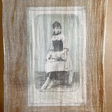 Art Into Life indeed! What a gorgeous package Takumi Akaishi’s Memoria is from head to toe. The album jacket features hand-glued, one-of-a-kind collages wrapped in gauzy fabric, which interestingly enough is exactly how the music sounds. Akaishi uses little more than a hurdy gurdy, a tube amp and tapes to create these stirring pieces, music that seems to have beautifully decayed through natural processes. The hurdy gurdy is most prominent and fairly continuous throughout, restlessly churning and groaning from its internal stress, like the warped boards of an old fishing boat if they had the ability to sing. Interstertial sounds seep through the cracks, which gives these pieces a sense of place, grounding the proceedings in the dirt and covering them with a thriving bed of moss. Certain moments slip into hypnotic drones (“Sea Change” has my head wobbling on its axis), whereas others detail quiet earthly motions, like what appears to be the sound of boots crunching through icy snow on “Lisbon, Hakodate”. Call it a noise record, I suppose, but it’s serene and oddly beautiful at times. Highly recommended for thoughtful listeners of labels like Open Mouth and Kye and appreciators of the esoteric and organic.
Art Into Life indeed! What a gorgeous package Takumi Akaishi’s Memoria is from head to toe. The album jacket features hand-glued, one-of-a-kind collages wrapped in gauzy fabric, which interestingly enough is exactly how the music sounds. Akaishi uses little more than a hurdy gurdy, a tube amp and tapes to create these stirring pieces, music that seems to have beautifully decayed through natural processes. The hurdy gurdy is most prominent and fairly continuous throughout, restlessly churning and groaning from its internal stress, like the warped boards of an old fishing boat if they had the ability to sing. Interstertial sounds seep through the cracks, which gives these pieces a sense of place, grounding the proceedings in the dirt and covering them with a thriving bed of moss. Certain moments slip into hypnotic drones (“Sea Change” has my head wobbling on its axis), whereas others detail quiet earthly motions, like what appears to be the sound of boots crunching through icy snow on “Lisbon, Hakodate”. Call it a noise record, I suppose, but it’s serene and oddly beautiful at times. Highly recommended for thoughtful listeners of labels like Open Mouth and Kye and appreciators of the esoteric and organic.
Bloody Hell The Consultation 7″ (Spik & Span)
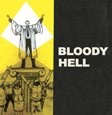 From the band name, the stark visual presentation and a song called “Sex Dot Com”, I repeated the mantra of “please don’t be a Brainbombs rip, please don’t be a Brainbombs rip” as I brought Bloody Hell’s new EP to my turntable. What sweet relief, then, to discover that Melbourne’s Bloody Hell couldn’t be further from that! They play a mischievous form of art-rock that nods towards Talking Heads and The Makers Of The Dead Travel Fast, musical auteurs who refused to be pigeonholed (or take themselves too seriously). They’ve got bass, drums and guitar, but keyboards and sax as well, which gives these dance-y tracks a freaky-fun sensation similar to when one gazes upon a photo of The B-52’s from 1979. “Keep It On” features a rousing repeated chorus of “keep your track suit on”, whereas “Weeds And Seeds” feels like four different M Squared-related groups at once, settling closest to Wild West. Looks like Spik & Span released a Kraus split single prior to this, which, while stylistically different, makes sense on an aesthetic wavelength, both artists clearly delighted by their own wonky orbits. As am I!
From the band name, the stark visual presentation and a song called “Sex Dot Com”, I repeated the mantra of “please don’t be a Brainbombs rip, please don’t be a Brainbombs rip” as I brought Bloody Hell’s new EP to my turntable. What sweet relief, then, to discover that Melbourne’s Bloody Hell couldn’t be further from that! They play a mischievous form of art-rock that nods towards Talking Heads and The Makers Of The Dead Travel Fast, musical auteurs who refused to be pigeonholed (or take themselves too seriously). They’ve got bass, drums and guitar, but keyboards and sax as well, which gives these dance-y tracks a freaky-fun sensation similar to when one gazes upon a photo of The B-52’s from 1979. “Keep It On” features a rousing repeated chorus of “keep your track suit on”, whereas “Weeds And Seeds” feels like four different M Squared-related groups at once, settling closest to Wild West. Looks like Spik & Span released a Kraus split single prior to this, which, while stylistically different, makes sense on an aesthetic wavelength, both artists clearly delighted by their own wonky orbits. As am I!
Borusiade Fortunate Isolation LP (Dark Entries)
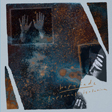 Damn… do you think Borusiade has since reconsidered the title to this, her second full-length, considering the circumstances we’re in? Maybe, but maybe not, as her music has always seemed to carry a gloomy loner vibe, as though she is ensconced in a dark room full of dancing people but still all alone. I’m a fan, for sure, and this new album showcases her various sides, from spooky dark-wave to club-thumping electro and industrial-ambient distress signals. “Time (No Time)” does a fine job of combining nearly all these aesthetics into one cut, recalling St. Julien, Whodini’s “Haunted House Of Rock” and much of the Galakthorrö label in equal supply. “When I Read The News Today” is nocturnal industrial-synth reminiscent of Richard H. Kirk’s recent solo outings, whereas “Lament (Fortunate Isolation)” comes through with a gorgeous vocal melody over an insistent synth pulse, an unlikely pop anthem were it to ever crawl out of the shadows. Borusiade’s voice guides much of Fortunate Isolation, if not through lyrics (like in “Lament”) then through the palpable emotion her voice provides, even if it’s the emotion of “miserable disinterest”. Now that we’re all stuck in our countless solitary confinements, I hope Borusiade is happy!
Damn… do you think Borusiade has since reconsidered the title to this, her second full-length, considering the circumstances we’re in? Maybe, but maybe not, as her music has always seemed to carry a gloomy loner vibe, as though she is ensconced in a dark room full of dancing people but still all alone. I’m a fan, for sure, and this new album showcases her various sides, from spooky dark-wave to club-thumping electro and industrial-ambient distress signals. “Time (No Time)” does a fine job of combining nearly all these aesthetics into one cut, recalling St. Julien, Whodini’s “Haunted House Of Rock” and much of the Galakthorrö label in equal supply. “When I Read The News Today” is nocturnal industrial-synth reminiscent of Richard H. Kirk’s recent solo outings, whereas “Lament (Fortunate Isolation)” comes through with a gorgeous vocal melody over an insistent synth pulse, an unlikely pop anthem were it to ever crawl out of the shadows. Borusiade’s voice guides much of Fortunate Isolation, if not through lyrics (like in “Lament”) then through the palpable emotion her voice provides, even if it’s the emotion of “miserable disinterest”. Now that we’re all stuck in our countless solitary confinements, I hope Borusiade is happy!
Caribou Suddenly LP (Merge)
 Times like these call for music that can emotionally coddle me, so I decided to check back in with Dan Snaith’s Caribou project after not paying attention to the Canadian artist since he was going under the name of Manitoba many years ago. (Who sued him to change the name, anyway? The actual province of Manitoba?) Considering the terms of what I was hoping Caribou would deliver, I’m completely satiated by Suddenly, a soft, tender and loop-friendly suite of charming electronic pop tunes. These songs sound like careful Kompakt-approved remixes of main-stage festival-pop acts Phoenix and M83, knowingly retro in sonic signifiers and decidedly modern in production techniques. They’re perfect songs for a midnight rave populated by elementary school children, safe and dance-y electro-folk fun with a sense of security that nothing will get too out of hand, or if it does, loving adult guardians are close-by. Snaith’s singing voice is a rainbow of beiges, perfectly suited to these songs no matter if it’s the clappy throwback funk of “Home” or the moonlit synth arpeggios of “Sister”. Getting a lot of mileage out of Suddenly, more than I expected, which could be due to my need for untroubled sonic comfort-food; Caribou’s knack for finding the coziest sweet-spot hooks for his synthetic, house-y indie pop songs; or most likely a combination of the two.
Times like these call for music that can emotionally coddle me, so I decided to check back in with Dan Snaith’s Caribou project after not paying attention to the Canadian artist since he was going under the name of Manitoba many years ago. (Who sued him to change the name, anyway? The actual province of Manitoba?) Considering the terms of what I was hoping Caribou would deliver, I’m completely satiated by Suddenly, a soft, tender and loop-friendly suite of charming electronic pop tunes. These songs sound like careful Kompakt-approved remixes of main-stage festival-pop acts Phoenix and M83, knowingly retro in sonic signifiers and decidedly modern in production techniques. They’re perfect songs for a midnight rave populated by elementary school children, safe and dance-y electro-folk fun with a sense of security that nothing will get too out of hand, or if it does, loving adult guardians are close-by. Snaith’s singing voice is a rainbow of beiges, perfectly suited to these songs no matter if it’s the clappy throwback funk of “Home” or the moonlit synth arpeggios of “Sister”. Getting a lot of mileage out of Suddenly, more than I expected, which could be due to my need for untroubled sonic comfort-food; Caribou’s knack for finding the coziest sweet-spot hooks for his synthetic, house-y indie pop songs; or most likely a combination of the two.
Cold Feet Punk Entity 12″ (Feel It)
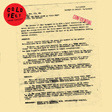 Here’s a testament to the thriving, bountiful American hardcore scene: an excellent hardcore group from Baltimore! When was the last time this happened, never? Obviously Trapped Under Ice count, but I’m talking classic fast American hardcore-punk, a style that seems to have eluded Baltimore over the years. (To be fair, there is so much great underground punk outta that fine city, it’s usually just weird or disgruntled or psychotic in a way that traditional hardcore-punk isn’t.) Anyway, Feel It did what they always do and gave this talented young group their vinyl debut, which is a meaty, hard-pounding ripper in the classic tradition. I’m hearing Gang Green, Career Suicide, The Worst, Poison Idea, Necros and Kraut, with some slightly Swedish leanings (the drums are relentlessly tumbling forward) that are clearly assimilated into Cold Feet’s melting pot. They adhere to the format pretty closely, with nary the scents of John Waters or Mike Apichella surrounding the proceedings. It’s almost suspiciously traditional, but only almost – the attitude and presentation of Punk Entity, down to its fake “CIA letter warning you about the band” cover art, ring sincere. Alright Feel It, I challenge you to locate some top-notch ‘core from Honolulu and Anchorage. I have faith.
Here’s a testament to the thriving, bountiful American hardcore scene: an excellent hardcore group from Baltimore! When was the last time this happened, never? Obviously Trapped Under Ice count, but I’m talking classic fast American hardcore-punk, a style that seems to have eluded Baltimore over the years. (To be fair, there is so much great underground punk outta that fine city, it’s usually just weird or disgruntled or psychotic in a way that traditional hardcore-punk isn’t.) Anyway, Feel It did what they always do and gave this talented young group their vinyl debut, which is a meaty, hard-pounding ripper in the classic tradition. I’m hearing Gang Green, Career Suicide, The Worst, Poison Idea, Necros and Kraut, with some slightly Swedish leanings (the drums are relentlessly tumbling forward) that are clearly assimilated into Cold Feet’s melting pot. They adhere to the format pretty closely, with nary the scents of John Waters or Mike Apichella surrounding the proceedings. It’s almost suspiciously traditional, but only almost – the attitude and presentation of Punk Entity, down to its fake “CIA letter warning you about the band” cover art, ring sincere. Alright Feel It, I challenge you to locate some top-notch ‘core from Honolulu and Anchorage. I have faith.
The Cosmic Sand Dollars Requiem For King Dick LP (Old Comet)
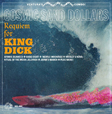 Who better to eulogize the passing of universally-beloved surf god Dick Dale than the freakiest surf-rock tricksters out there, The Cosmic Sand Dollars? I loved their first album and all its inexplicable weirdness, so I dug right in the moment Requiem For King Dick landed on my doorstep. The general musical aesthetic remains the same: start with traditional electric surf-guitar and subject it to a buffet of torture techniques. A surf instrumental will be digitally unraveled, as if the WAV file was retrieved off an iPhone that recently fell in the toilet; a chiptune interlude will corrupt the inherent surfability using what sounds like 1998’s best available technology; a pitched-down voice will recite a psychotic narrative over some chintzy organs. Requiem For King Dick flows with a good-natured haphazardness, the ‘Dollars inviting us on their weird little nuclear-fallout sci-fi take on the genre, injecting just enough surf music to keep us grounded while shaking every other detail until they’re out of order. A man named “Tony Melino” is credited with “accompaniment” on this record, which means that either they spelled “Tony Molina” wrong or there is another guy with a similar name operating in a similar scene – either way, I’m elated!
Who better to eulogize the passing of universally-beloved surf god Dick Dale than the freakiest surf-rock tricksters out there, The Cosmic Sand Dollars? I loved their first album and all its inexplicable weirdness, so I dug right in the moment Requiem For King Dick landed on my doorstep. The general musical aesthetic remains the same: start with traditional electric surf-guitar and subject it to a buffet of torture techniques. A surf instrumental will be digitally unraveled, as if the WAV file was retrieved off an iPhone that recently fell in the toilet; a chiptune interlude will corrupt the inherent surfability using what sounds like 1998’s best available technology; a pitched-down voice will recite a psychotic narrative over some chintzy organs. Requiem For King Dick flows with a good-natured haphazardness, the ‘Dollars inviting us on their weird little nuclear-fallout sci-fi take on the genre, injecting just enough surf music to keep us grounded while shaking every other detail until they’re out of order. A man named “Tony Melino” is credited with “accompaniment” on this record, which means that either they spelled “Tony Molina” wrong or there is another guy with a similar name operating in a similar scene – either way, I’m elated!
Walter Daniels & The Hungry Hearts Out At Dusk / Where’s The Pain Point 7″ (Spacecase)
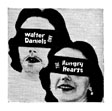 Walter Daniels and The Hungry Hearts – Walter Daniels and the Hah-hah-hu-ungry hea-e-arts! Is it possible to read that name without falling into the chorus of that irrepressible Bruce Springsteen song? Anyway, I doubt that was much of a concern to Walter Daniels and his band of Hungry Hearts, as this is some dirt-kickin’, staggering-towards-the-bar blues-punk that barely keeps it together. Which is just how I’d prefer it! “Out At Dusk” sounds like drummer Luis Tissot is slapping old car parts, with guitars chugging along on muscle memory and Daniels kinda blathering into the mic, repeating his two or three lines of lyrics and then wailing on his harmonica in some feverish fit of expression. “Where’s The Pain Point” slows it down, Daniels belligerently bragging moments before falling off his stool, the rest of the band paradoxically locked into a shambolic looseness. Both tracks have the mania of Obnox, but with a sense that Walter Daniels and company are significantly closer to their respective graves (and don’t care). Somehow this reminds me of how sliders were called “sliders” because they slide down into your belly – maybe it’s all the grease that these two songs rolled around in? Blues-punk is rarely my bag, but the gasoline stench of this single is undeniably satisfying.
Walter Daniels and The Hungry Hearts – Walter Daniels and the Hah-hah-hu-ungry hea-e-arts! Is it possible to read that name without falling into the chorus of that irrepressible Bruce Springsteen song? Anyway, I doubt that was much of a concern to Walter Daniels and his band of Hungry Hearts, as this is some dirt-kickin’, staggering-towards-the-bar blues-punk that barely keeps it together. Which is just how I’d prefer it! “Out At Dusk” sounds like drummer Luis Tissot is slapping old car parts, with guitars chugging along on muscle memory and Daniels kinda blathering into the mic, repeating his two or three lines of lyrics and then wailing on his harmonica in some feverish fit of expression. “Where’s The Pain Point” slows it down, Daniels belligerently bragging moments before falling off his stool, the rest of the band paradoxically locked into a shambolic looseness. Both tracks have the mania of Obnox, but with a sense that Walter Daniels and company are significantly closer to their respective graves (and don’t care). Somehow this reminds me of how sliders were called “sliders” because they slide down into your belly – maybe it’s all the grease that these two songs rolled around in? Blues-punk is rarely my bag, but the gasoline stench of this single is undeniably satisfying.
DJ Hank Traffic Control 12″ (Sophomore Lounge)
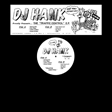 Glad to exist in a world where ex-members of Whatever Brains are also respected participants of the Chicago footwork scene. I’m referring to DJ Hank, who moved from North Carolina to Chicago, became immersed in the sets of DJ Rashad and the like, and has taken up track production himself. This is his first vinyl release, and he stuffs it with eight tunes that run through a number of electronic sub-genres but are tied together with playfulness and ear-catching samples. Some tracks remind me of turn-of-the-century IDM, others recall Nicolas Jaar’s dance edits, and the majority bear some form of footwork’s imprint, usually the stutter-step bass kicks and trademark rhythms. Mostly, I like Hank’s ear for sampling, whether he’s taking an Instagram-sourced rant, funny phrase or sound effect. The most obvious and immediately gratifying track for me is the title track, which runs through the standard cycle of car-alarm sounds perfectly synced to a popping Miami bass beat. It’s so stupid and so good, which is often the winning formula for footwork music – direct and gritty and prompting a chuckle or two, the musical equivalent of a great dank meme. An interesting, unexpected release for Sophomore Lounge, although as details become clearer (an apparent mutual relation to the experimental group PC Worship brought them together), it makes perfect modern sense.
Glad to exist in a world where ex-members of Whatever Brains are also respected participants of the Chicago footwork scene. I’m referring to DJ Hank, who moved from North Carolina to Chicago, became immersed in the sets of DJ Rashad and the like, and has taken up track production himself. This is his first vinyl release, and he stuffs it with eight tunes that run through a number of electronic sub-genres but are tied together with playfulness and ear-catching samples. Some tracks remind me of turn-of-the-century IDM, others recall Nicolas Jaar’s dance edits, and the majority bear some form of footwork’s imprint, usually the stutter-step bass kicks and trademark rhythms. Mostly, I like Hank’s ear for sampling, whether he’s taking an Instagram-sourced rant, funny phrase or sound effect. The most obvious and immediately gratifying track for me is the title track, which runs through the standard cycle of car-alarm sounds perfectly synced to a popping Miami bass beat. It’s so stupid and so good, which is often the winning formula for footwork music – direct and gritty and prompting a chuckle or two, the musical equivalent of a great dank meme. An interesting, unexpected release for Sophomore Lounge, although as details become clearer (an apparent mutual relation to the experimental group PC Worship brought them together), it makes perfect modern sense.
Family Underground Glitchblade / Sand Between Us 7″ (I Dischi Del Barone)
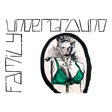 I had wrongly assumed that like most of their fellow class-of-2004 drone-noise-experimentalists, Family Underground had faded into the ether (or had kids, or opened a bar, or got into memes), but nope: turns out this Danish duo (a trio in the past?) have been pretty consistently doing their thing without interruption for over seventeen years. Wow! I applaud their dedication, and the two tracks on this new I Dischi 7″ display no lack of ideas. While certainly classifiable under “experimental / noise”, “Glitchblade” operates with its own vocabulary: some sort of affected keyboard, sounding like a dubby Rhodes, is plunked in a bizarre sequence while it sounds like a neighbor is mowing some chunky patch of lawn and a psych band is practicing down the hall. I’m reminded of Rabih Beaini’s 2013 album in the way that it resembles some sort of cosmic jazz without any traditional jazz instrumentation. “Sand Between Us” inhabits a similar psychic space with different instrumentation – extended keys meld with screaming feedback, bongos and hand percussion, as if Family Underground crawled into a snippet of some ’70s Pink Floyd bootleg and laid their eggs inside. Great stuff, which has me wondering what Double Leopards or Hair Police would be sounding like if they made it to 2020. Maybe it’s time I gave fan-fiction a go.
I had wrongly assumed that like most of their fellow class-of-2004 drone-noise-experimentalists, Family Underground had faded into the ether (or had kids, or opened a bar, or got into memes), but nope: turns out this Danish duo (a trio in the past?) have been pretty consistently doing their thing without interruption for over seventeen years. Wow! I applaud their dedication, and the two tracks on this new I Dischi 7″ display no lack of ideas. While certainly classifiable under “experimental / noise”, “Glitchblade” operates with its own vocabulary: some sort of affected keyboard, sounding like a dubby Rhodes, is plunked in a bizarre sequence while it sounds like a neighbor is mowing some chunky patch of lawn and a psych band is practicing down the hall. I’m reminded of Rabih Beaini’s 2013 album in the way that it resembles some sort of cosmic jazz without any traditional jazz instrumentation. “Sand Between Us” inhabits a similar psychic space with different instrumentation – extended keys meld with screaming feedback, bongos and hand percussion, as if Family Underground crawled into a snippet of some ’70s Pink Floyd bootleg and laid their eggs inside. Great stuff, which has me wondering what Double Leopards or Hair Police would be sounding like if they made it to 2020. Maybe it’s time I gave fan-fiction a go.
Fried E/M Modern World LP (Lumpy)
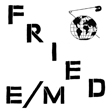 It’s safe to say that in 2020, the slime-punk of Lumpy Records is no longer the Hot New Thing in underground hardcore, and that’s probably for the best – us appreciators of sincerely weird-ugly hardcore-punk can enjoy it without worrying that Vice is gonna try to act like they actually care about it too. Modern World is my first encounter with St. Louis’s Fried E/M (who I previously thought had something to do with Richmond’s Fried Egg, if you can forgive me), and I’ll be damned if they aren’t the second coming of Circle Jerks. I’m talking prime Circle Jerks, Group Sex era, where the songs are simplistic yet varied, punk as hell and sarcastic and utterly disgusted, with discernible lyrics that you want to shout along with at oncoming traffic. The recording is spot on – crackling and raw but never overbearingly noisy or lo-fi – and the songs lend themselves perfectly to it, as if they should be played by delinquent teens to a crowd of disinterested Huntington Beach burnouts and unwitting nuclear families just trying to get to the pier. Nothing weird or ironic or remotely cartoonish, if you were expecting something more akin to Lumpy & The Dumpers or Janitor Scum, just pure American hardcore punk energy that sounds like it should’ve been made by people named Dez, Chuck, Lucky and Greg (Hetson or Ginn, I suppose). Lumpy himself apparently plays drums (and is incredibly talented, go figure!), furthering his status as one of the most productive and necessary punks of our modern time. Seeing as “Inner Peace” and “Lobotomy” will easily be two of the best punk songs I’ll hear this year, I may have to send him a letter thanking him for all his hard work, even though he’d probably wipe his butt with it.
It’s safe to say that in 2020, the slime-punk of Lumpy Records is no longer the Hot New Thing in underground hardcore, and that’s probably for the best – us appreciators of sincerely weird-ugly hardcore-punk can enjoy it without worrying that Vice is gonna try to act like they actually care about it too. Modern World is my first encounter with St. Louis’s Fried E/M (who I previously thought had something to do with Richmond’s Fried Egg, if you can forgive me), and I’ll be damned if they aren’t the second coming of Circle Jerks. I’m talking prime Circle Jerks, Group Sex era, where the songs are simplistic yet varied, punk as hell and sarcastic and utterly disgusted, with discernible lyrics that you want to shout along with at oncoming traffic. The recording is spot on – crackling and raw but never overbearingly noisy or lo-fi – and the songs lend themselves perfectly to it, as if they should be played by delinquent teens to a crowd of disinterested Huntington Beach burnouts and unwitting nuclear families just trying to get to the pier. Nothing weird or ironic or remotely cartoonish, if you were expecting something more akin to Lumpy & The Dumpers or Janitor Scum, just pure American hardcore punk energy that sounds like it should’ve been made by people named Dez, Chuck, Lucky and Greg (Hetson or Ginn, I suppose). Lumpy himself apparently plays drums (and is incredibly talented, go figure!), furthering his status as one of the most productive and necessary punks of our modern time. Seeing as “Inner Peace” and “Lobotomy” will easily be two of the best punk songs I’ll hear this year, I may have to send him a letter thanking him for all his hard work, even though he’d probably wipe his butt with it.
Hallelujah! Wanna Dance LP (Maple Death)
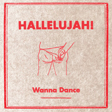 Following a handful of EPs, Verona, Italy’s Hallelujah! continue their march toward synth-punk numbskullery with their debut album. The cover image prominently displays a wedgie being picked, and these songs fit right into that sort of sensibility – for example, there’s the song “Your Duck”, which features a repeated chorus of “now I wanna be your duck”. Mmhmm, that’s what we’re dealing with here. I vaguely recall there being guitar on previous records, but they’re operating with a streamlined approach of bass/drums/synths on Wanna Dance, and to be honest I don’t miss the guitar at all, were it ever there to begin with. Whereas most synth-punk tends to favor rigid, jittery rhythms, this plays out looser and (presumably a bit) drunker, feeling like a band that would’ve found itself in Load Records’ orbit in the early ’00s rather than something directly indebted to Screamers or Primitive Calculators. And more than anything else, the title track sounds like an early LCD Soundsystem practice recording, with its repetitive staccato vocals and insistent groove. Not a bad one to add to your ever-growing “belligerent dance party” playlist.
Following a handful of EPs, Verona, Italy’s Hallelujah! continue their march toward synth-punk numbskullery with their debut album. The cover image prominently displays a wedgie being picked, and these songs fit right into that sort of sensibility – for example, there’s the song “Your Duck”, which features a repeated chorus of “now I wanna be your duck”. Mmhmm, that’s what we’re dealing with here. I vaguely recall there being guitar on previous records, but they’re operating with a streamlined approach of bass/drums/synths on Wanna Dance, and to be honest I don’t miss the guitar at all, were it ever there to begin with. Whereas most synth-punk tends to favor rigid, jittery rhythms, this plays out looser and (presumably a bit) drunker, feeling like a band that would’ve found itself in Load Records’ orbit in the early ’00s rather than something directly indebted to Screamers or Primitive Calculators. And more than anything else, the title track sounds like an early LCD Soundsystem practice recording, with its repetitive staccato vocals and insistent groove. Not a bad one to add to your ever-growing “belligerent dance party” playlist.
Harsh R The Burden 12″ (no label)
 After four cassettes, Olympia’s Harsh R takes it to vinyl with this succinct and aggressive five-track EP. The Burden is an industrial EBM record, for sure, but rather than stretch things out into lengthy dance mixes, these five tracks are in and out quickly, none over three minutes. The music hits hard, focusing on aggression over any sense of melody, with shouted vocals to drive the point home… straightforwardness wielded with conscious intent, as I can’t think of many other EBM acts who cut their tracks this short. These tunes would fit alongside Klinik, A Split – Second and Mike Berdan’s Canal Street Electronics project, and while no guitars are found on this recording, it carries enough of a metallic swagger that your Korn-obsessed cousins wouldn’t commandeer the aux cable if you blasted “The Shroud” at a family gathering (or, in a tent at The Gathering). What I find most interesting and unique about this record is the booklet that comes with it, providing not only lyrics and lyrical explanations, but a track-by-track listing of the way in which the songs themselves were inspired and then crafted, going into specific technical detail. It’s a thoughtful update on the “it was easy it was cheap go and do it” ethos set forth by Desperate Bicycles, with Harsh R welcoming the listener to not only enjoy his music, but to take from his knowledge and experience to make noise of their own.
After four cassettes, Olympia’s Harsh R takes it to vinyl with this succinct and aggressive five-track EP. The Burden is an industrial EBM record, for sure, but rather than stretch things out into lengthy dance mixes, these five tracks are in and out quickly, none over three minutes. The music hits hard, focusing on aggression over any sense of melody, with shouted vocals to drive the point home… straightforwardness wielded with conscious intent, as I can’t think of many other EBM acts who cut their tracks this short. These tunes would fit alongside Klinik, A Split – Second and Mike Berdan’s Canal Street Electronics project, and while no guitars are found on this recording, it carries enough of a metallic swagger that your Korn-obsessed cousins wouldn’t commandeer the aux cable if you blasted “The Shroud” at a family gathering (or, in a tent at The Gathering). What I find most interesting and unique about this record is the booklet that comes with it, providing not only lyrics and lyrical explanations, but a track-by-track listing of the way in which the songs themselves were inspired and then crafted, going into specific technical detail. It’s a thoughtful update on the “it was easy it was cheap go and do it” ethos set forth by Desperate Bicycles, with Harsh R welcoming the listener to not only enjoy his music, but to take from his knowledge and experience to make noise of their own.
Paul Haslinger Exit Ghost LP (Artificial Instinct)
 Austrian composer Paul Haslinger has a pretty solid resume: join Tangerine Dream in 1986, proceed to make fifteen albums with them over the next five years (wow), then shift toward soundtrack work for big-budget Hollywood flicks like the Underworld series, Resident Evil and The Three Musketeers. He must have a sick house somewhere in the Hollywood Hills, and while I’m sitting here fantasizing about the Eames recliners and Nakashima credenzas that surely furnish his home, Exit Ghost is a suitable soundtrack in its own right. As someone clearly skilled at making music that colors a scene without overpowering it, this album is pretty content to fade into the recesses of one’s mind while listening, even if the listener isn’t doing anything particularly engaging. Somber, elegiac piano is the prominent instrumentation, and it’s aided by soft electronic squiggles, ambient drifts and calm electronics. I’d imagine Haslinger can toss off an album like this before finishing his morning cup of coffee, although I’m assuming he labored over these tracks a little longer than that. Pleasantly unobtrusive, but seeing as I hear the work of Haslinger whenever I watch an episode of Halt And Catch Fire or the 2008 Death Race remake (to name but a couple more of his soundtrack jobs), I feel as though he’s already been capturing plenty of my time, if not my focused attention.
Austrian composer Paul Haslinger has a pretty solid resume: join Tangerine Dream in 1986, proceed to make fifteen albums with them over the next five years (wow), then shift toward soundtrack work for big-budget Hollywood flicks like the Underworld series, Resident Evil and The Three Musketeers. He must have a sick house somewhere in the Hollywood Hills, and while I’m sitting here fantasizing about the Eames recliners and Nakashima credenzas that surely furnish his home, Exit Ghost is a suitable soundtrack in its own right. As someone clearly skilled at making music that colors a scene without overpowering it, this album is pretty content to fade into the recesses of one’s mind while listening, even if the listener isn’t doing anything particularly engaging. Somber, elegiac piano is the prominent instrumentation, and it’s aided by soft electronic squiggles, ambient drifts and calm electronics. I’d imagine Haslinger can toss off an album like this before finishing his morning cup of coffee, although I’m assuming he labored over these tracks a little longer than that. Pleasantly unobtrusive, but seeing as I hear the work of Haslinger whenever I watch an episode of Halt And Catch Fire or the 2008 Death Race remake (to name but a couple more of his soundtrack jobs), I feel as though he’s already been capturing plenty of my time, if not my focused attention.
Kalle Hygien Absolute Bomber 7″ (Push My Buttons)
 Kalle Hygien used to play in The Manikins (no, not the Kim Salmon one, the Swedish power-poppers on P. Trash), and like many current-day punkers, he has found solace in making punk music under his own name (although to be fair, a couple of friends are credited here on drums and synths). There definitely seems to be kind of a distinct sound to many “one man band” punk projects – rudimentary drum programming, direct-to-digital fuzz guitars, a subtle sense of buffoonery – and while this four-song EP mostly checks those same boxes, it’s also a pretty fun listen, and certainly better than the median average. “Absolute Bomber” recalls Attentat or maybe even a touch of Kalashnikov, but the morse-code rhythm box makes it a little less threatening and a little more fun. “Troubles” is similar if a bit more ‘core, but the two songs on the flipside push into weirder territory, not entirely removed from what Urochromes are up to with a menacingly bleepy synth hook reminiscent of first-wave Midwestern mutant-punks like Count Vertigo or Dow Jones & The Industrials. A fairly overdone conceit, the synth-laden weirdo-hardcore solo project, but Hygien is clearly intent on writing actual memorable songs instead of just filling the air with a vibe, and Absolute Bomber succeeds because of it.
Kalle Hygien used to play in The Manikins (no, not the Kim Salmon one, the Swedish power-poppers on P. Trash), and like many current-day punkers, he has found solace in making punk music under his own name (although to be fair, a couple of friends are credited here on drums and synths). There definitely seems to be kind of a distinct sound to many “one man band” punk projects – rudimentary drum programming, direct-to-digital fuzz guitars, a subtle sense of buffoonery – and while this four-song EP mostly checks those same boxes, it’s also a pretty fun listen, and certainly better than the median average. “Absolute Bomber” recalls Attentat or maybe even a touch of Kalashnikov, but the morse-code rhythm box makes it a little less threatening and a little more fun. “Troubles” is similar if a bit more ‘core, but the two songs on the flipside push into weirder territory, not entirely removed from what Urochromes are up to with a menacingly bleepy synth hook reminiscent of first-wave Midwestern mutant-punks like Count Vertigo or Dow Jones & The Industrials. A fairly overdone conceit, the synth-laden weirdo-hardcore solo project, but Hygien is clearly intent on writing actual memorable songs instead of just filling the air with a vibe, and Absolute Bomber succeeds because of it.
Isotope Soap An Artifact Of Insects LP (Push My Buttons)
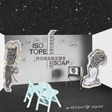 After a handful of EPs, Stockholm’s Isotope Soap molecularly-expand onto their first full-length, An Artifact Of Insects. Named in homage to Geza X’s best-known tune, they’re clearly going for mutant sci-fi synth-powered punk, and I’d say they pretty much succeed. If anything, it might be a little too polished and pro-sounding for the slimy chaos they’re looking to conjure, but it’s not a detriment overall, as their tight playing, ridiculous synths and vocal effects deserve to be heard without a crusty lo-fi barrier. I’m reminded of Nervous Gender, FNU Ronnies and the synth-ier Lumpy Records stuff (The Wad in particular), although Isotope Soap often take things a step further with ridiculously processed vocals, almost to the point where one might feel justified in calling them “fake” vocals. The result sounds like various Space Ghost villains on the mic, which provides a cartoonish aspect most punk groups would stop short of. It’s over the top, and certainly endangers the group from being taken seriously, but those who are interested in groups that are looking to push the limits of good-taste and suspended disbelief might relish this one – let’s call it the Gutalax Effect.
After a handful of EPs, Stockholm’s Isotope Soap molecularly-expand onto their first full-length, An Artifact Of Insects. Named in homage to Geza X’s best-known tune, they’re clearly going for mutant sci-fi synth-powered punk, and I’d say they pretty much succeed. If anything, it might be a little too polished and pro-sounding for the slimy chaos they’re looking to conjure, but it’s not a detriment overall, as their tight playing, ridiculous synths and vocal effects deserve to be heard without a crusty lo-fi barrier. I’m reminded of Nervous Gender, FNU Ronnies and the synth-ier Lumpy Records stuff (The Wad in particular), although Isotope Soap often take things a step further with ridiculously processed vocals, almost to the point where one might feel justified in calling them “fake” vocals. The result sounds like various Space Ghost villains on the mic, which provides a cartoonish aspect most punk groups would stop short of. It’s over the top, and certainly endangers the group from being taken seriously, but those who are interested in groups that are looking to push the limits of good-taste and suspended disbelief might relish this one – let’s call it the Gutalax Effect.
JASSS Whities 027 12″ (Whities)
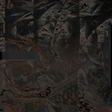 Surprised to see JASSS dropping a single on the Whities label – her music always struck me as closer to Throbbing Gristle than Aphex Twin in the great continuum of electronic music, whereas Whities was more of a post-modern techno concern. You can then imagine my surprise when throwing on the a-side, “Turbo Olé”, which references neither – this is a full-on cyber-rave meltdown. Staccato trance horns are deployed like common vampire thugs impeding Blade’s path through the catacombs, with a striking junglist-goth rhythm and heavy duty percussive elements. Throw a railing guitar line on top, and it could’ve worked as an instrumental on Cold Cave’s Cherish The Light Years, I swear! It’s so unembarrassed by its own cheesiness that it quickly transcends it, and while I do not understand why JASSS wrote it and why Whities released it, I’m in full agreement with their decisions. B-side “We Solve This Talking” is much closer to what I’d expect, a restless and jagged deployment of post-industrial artillery not unlike Objekt’s last album or something Rrose and Lucy would’ve conspired to create. It slowly blooms into rave formation as well, an army of glowstick-wielding ninjas locked into some basic choreo as the slower BPM chops away. Is this where JASSS is firmly headed, or is Whities 027 a neon anomaly? I look forward to finding out.
Surprised to see JASSS dropping a single on the Whities label – her music always struck me as closer to Throbbing Gristle than Aphex Twin in the great continuum of electronic music, whereas Whities was more of a post-modern techno concern. You can then imagine my surprise when throwing on the a-side, “Turbo Olé”, which references neither – this is a full-on cyber-rave meltdown. Staccato trance horns are deployed like common vampire thugs impeding Blade’s path through the catacombs, with a striking junglist-goth rhythm and heavy duty percussive elements. Throw a railing guitar line on top, and it could’ve worked as an instrumental on Cold Cave’s Cherish The Light Years, I swear! It’s so unembarrassed by its own cheesiness that it quickly transcends it, and while I do not understand why JASSS wrote it and why Whities released it, I’m in full agreement with their decisions. B-side “We Solve This Talking” is much closer to what I’d expect, a restless and jagged deployment of post-industrial artillery not unlike Objekt’s last album or something Rrose and Lucy would’ve conspired to create. It slowly blooms into rave formation as well, an army of glowstick-wielding ninjas locked into some basic choreo as the slower BPM chops away. Is this where JASSS is firmly headed, or is Whities 027 a neon anomaly? I look forward to finding out.
Kürøishi Sound The Alarm LP (SPHC)
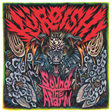 Finnish punks of a Japanophile persuasion have existed for quite nearly as long as hardcore has utilized the d-beat, and I find it both intriguing and understandable. Japanese hardcore rules, but there comes a point where tasteful homage turns into unnerving replication, which is closer to where Oulu, Finland’s Kürøishi (presumably named after the Japanese city of the same name) lands. Their artwork and design is both tribute and rip-off of classic Japanese hardcore, or perhaps more accurately, Japanese-imitating Finnish hardcore, as Selfish seems to be a particularly strong influence, along with the typical reappropriated Crass-style stencil logo (and Japanese lettering). Anyway, let’s get to the music, which could elevate Kürøishi beyond copycat pastiche, but sadly I’m not particularly impressed. They play a well-oiled, proficient form of stadium-crust, with vocals that emulate Todd Burdette of the mighty His Hero Is Gone and Tragedy. These songs maintain basically the same fast d-beat tempo throughout, raging through rote and conventional riffs with a seemingly endless supply of heavy-metal guitar solos. They certainly nail the style, but in all its well-produced, technically-sound glory, Sound The Alarm maintains the same general energy and pitch for its duration. If you’re down for that specific cause, you’ve hit the jackpot, whereas otherwise you might find yourself hankering for some actual Japanese crust instead, the type that doesn’t mind flashing its inherent weirdness or opts for a dirtier sound and presentation.
Finnish punks of a Japanophile persuasion have existed for quite nearly as long as hardcore has utilized the d-beat, and I find it both intriguing and understandable. Japanese hardcore rules, but there comes a point where tasteful homage turns into unnerving replication, which is closer to where Oulu, Finland’s Kürøishi (presumably named after the Japanese city of the same name) lands. Their artwork and design is both tribute and rip-off of classic Japanese hardcore, or perhaps more accurately, Japanese-imitating Finnish hardcore, as Selfish seems to be a particularly strong influence, along with the typical reappropriated Crass-style stencil logo (and Japanese lettering). Anyway, let’s get to the music, which could elevate Kürøishi beyond copycat pastiche, but sadly I’m not particularly impressed. They play a well-oiled, proficient form of stadium-crust, with vocals that emulate Todd Burdette of the mighty His Hero Is Gone and Tragedy. These songs maintain basically the same fast d-beat tempo throughout, raging through rote and conventional riffs with a seemingly endless supply of heavy-metal guitar solos. They certainly nail the style, but in all its well-produced, technically-sound glory, Sound The Alarm maintains the same general energy and pitch for its duration. If you’re down for that specific cause, you’ve hit the jackpot, whereas otherwise you might find yourself hankering for some actual Japanese crust instead, the type that doesn’t mind flashing its inherent weirdness or opts for a dirtier sound and presentation.
Jonny Kurt Und Die Hühnerficker Kombo Jonny Kurt Und Die Hühnerficker Kombo LP (PHantom / Plaste)
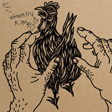 Chalk some of it up to the cultural divide, but this album from Jonny Kurt Und Die Hühnerficker Kombo is a confoundingly nutty album that can be tied to punk in spirit if not necessarily sound. A German fantasy of American hillbilly farm-life translated into loose, ugly songs? I can’t begin to understand the why of this record’s existence, but as for a ridiculous fake-country album filled with barnyard sounds (some sampled, some imitated by human mouths), this one is surprisingly listenable (and dare I say enjoyable?). Imagine Mojo Nixon’s music interpreted by Die Tödliche Doris, or the Government Issue side-project The Wanktones given a modern lo-fi nihilist-punk makeover. Some moments even remind me of Reynols in their song(ish) form, the way that untuned guitars clamber ever forward and vocals chortle and wheeze, in spite of the centuries of music history begging them not to. Jonny Kurt and crew certainly don’t take themselves too seriously, because really how could they, but they approach the barnyard setting with a Mummies-level of mania and have certainly earned my respect, if not quite adoration.
Chalk some of it up to the cultural divide, but this album from Jonny Kurt Und Die Hühnerficker Kombo is a confoundingly nutty album that can be tied to punk in spirit if not necessarily sound. A German fantasy of American hillbilly farm-life translated into loose, ugly songs? I can’t begin to understand the why of this record’s existence, but as for a ridiculous fake-country album filled with barnyard sounds (some sampled, some imitated by human mouths), this one is surprisingly listenable (and dare I say enjoyable?). Imagine Mojo Nixon’s music interpreted by Die Tödliche Doris, or the Government Issue side-project The Wanktones given a modern lo-fi nihilist-punk makeover. Some moments even remind me of Reynols in their song(ish) form, the way that untuned guitars clamber ever forward and vocals chortle and wheeze, in spite of the centuries of music history begging them not to. Jonny Kurt and crew certainly don’t take themselves too seriously, because really how could they, but they approach the barnyard setting with a Mummies-level of mania and have certainly earned my respect, if not quite adoration.
Muro Pacificar LP (Beach Impediment)
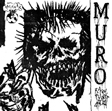 Pacificar is the second album from Bogota, Colombia’s Muro to come through these pages, and for the record, I was lukewarm on the first. Thinking the problem might’ve been me, not them, I came into Pacificar with an open mind (if you can’t trust Beach Impediment for burly, brick-and-mortar hardcore, who can you trust?), and I dunno… my feelings toward Muro generally remain the same. Their fast n’ raw pogo-core attack remains in place, as if Rattus was playing the belligerent street-punk riffs one might associate with No Future Records and recorded with the thick n’ heavy sound of Destino Final, but somehow it doesn’t move me the way such an equation should. Perhaps it’s that these songs sound more controlled than I’d hope, as if the members of Muro are not bursting at their physical limits but playing these songs well within their capabilities, or that they have the fist-pumping rhythms of The Casualties without the same memorable hooks, or maybe I’m simply hitting an overload of this particular strain of hardcore at the moment. The vocalist’s reverby bark is nearly interchangeable from so many other groups of a similar style, and while it’s certainly an appropriate approach, I find my mind drifting as Pacificar plays on. If we were in a drought of great current hardcore music, Pacificar would be a godsend, but in this era of sprawling hardcore bounty, it fails to make a splash.
Pacificar is the second album from Bogota, Colombia’s Muro to come through these pages, and for the record, I was lukewarm on the first. Thinking the problem might’ve been me, not them, I came into Pacificar with an open mind (if you can’t trust Beach Impediment for burly, brick-and-mortar hardcore, who can you trust?), and I dunno… my feelings toward Muro generally remain the same. Their fast n’ raw pogo-core attack remains in place, as if Rattus was playing the belligerent street-punk riffs one might associate with No Future Records and recorded with the thick n’ heavy sound of Destino Final, but somehow it doesn’t move me the way such an equation should. Perhaps it’s that these songs sound more controlled than I’d hope, as if the members of Muro are not bursting at their physical limits but playing these songs well within their capabilities, or that they have the fist-pumping rhythms of The Casualties without the same memorable hooks, or maybe I’m simply hitting an overload of this particular strain of hardcore at the moment. The vocalist’s reverby bark is nearly interchangeable from so many other groups of a similar style, and while it’s certainly an appropriate approach, I find my mind drifting as Pacificar plays on. If we were in a drought of great current hardcore music, Pacificar would be a godsend, but in this era of sprawling hardcore bounty, it fails to make a splash.
Nag Dead Deer LP (Die Slaughterhaus)
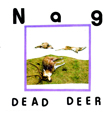 Atlanta’s Nag are one of the most underrated punk bands playing today, but maybe that’ll change now that they have this great album available to the public. It’s their first full-length following a handful of singles, and it doesn’t change up their formula (pounding, repetitive, grayscale punk) so much as add to the number of great tunes they’ve already got. The mood is certainly “dark side of Posh Boy”, with an occasional resemblance to early Total Control in the way that the riffs are more mechanical than emotional, with plenty of fast down-picking. Perhaps if you melded the opposite sounds of A Frames and Carbonas, you’d get something akin to Dead Deer? I suppose the same equation might fit for Rank/Xerox, in a way, and I like them a lot too. Nag’s songs are certainly more punk than post-punk, but there’s a dreary maturity to these tunes that a person of my age and social standing finds quite appealing. I liked Dead Deer upon first listen, and have only grown more attached through repeated plays, as the unique shapes of these songs continue to reveal themselves. “Day Glow”, for example, is a dagger-shaped shard that’ll cut through most anything.
Atlanta’s Nag are one of the most underrated punk bands playing today, but maybe that’ll change now that they have this great album available to the public. It’s their first full-length following a handful of singles, and it doesn’t change up their formula (pounding, repetitive, grayscale punk) so much as add to the number of great tunes they’ve already got. The mood is certainly “dark side of Posh Boy”, with an occasional resemblance to early Total Control in the way that the riffs are more mechanical than emotional, with plenty of fast down-picking. Perhaps if you melded the opposite sounds of A Frames and Carbonas, you’d get something akin to Dead Deer? I suppose the same equation might fit for Rank/Xerox, in a way, and I like them a lot too. Nag’s songs are certainly more punk than post-punk, but there’s a dreary maturity to these tunes that a person of my age and social standing finds quite appealing. I liked Dead Deer upon first listen, and have only grown more attached through repeated plays, as the unique shapes of these songs continue to reveal themselves. “Day Glow”, for example, is a dagger-shaped shard that’ll cut through most anything.
Neinzer Whities 025 12″ (Whities)
 It was maybe a couple of months ago that I commented something to the effect that Whities had fallen off a bit, and it stands out as one of the more regrettable opinions I’ve shared on here in recent times. The last few Whities releases have been knockouts, or at least perplexingly cool, as is the case with Neinzer’s new one. There are two tracks on the a-side, “Voyager” and “Deff”, both of which pump out eccentric forms of techno. I’m reminded of Hessle Audio’s prime, when weird new 12″s by producers like Elgato and Bandshell would spring up seemingly out of an alternate reality. “Voyager” is like a T++ track guided by the cutest little tugboat, whereas “Deff” is oddly calming, at least until the punchy vocal snippets arrive. I was ready for three more tracks like this on the b-side, but Neinzer screeched across three lanes and took the exit ramp to peculiar new realms. “Elliptical Footsteps” is a hypnotic lullaby flashback sequence, a beatless dream-state I’d expect the ghost of Ken Nordine to be wandering through. Hmm! “Ronda” utilizes similar slumber-y tones and adds some ASMR vocal trickery, to ensure the room I’m inhabiting slightly tilts. Just when I’m wondering if I’ve been dosed, “Falafalus” saunters in on softly frantic kalimbas, with more ASMR sound-effects tickling the inner hairs of my ears. Whities 025 starts weird and gets progressively weirder, a journey from dance-floor to Lynchian nether-zones that I suggest you strongly consider.
It was maybe a couple of months ago that I commented something to the effect that Whities had fallen off a bit, and it stands out as one of the more regrettable opinions I’ve shared on here in recent times. The last few Whities releases have been knockouts, or at least perplexingly cool, as is the case with Neinzer’s new one. There are two tracks on the a-side, “Voyager” and “Deff”, both of which pump out eccentric forms of techno. I’m reminded of Hessle Audio’s prime, when weird new 12″s by producers like Elgato and Bandshell would spring up seemingly out of an alternate reality. “Voyager” is like a T++ track guided by the cutest little tugboat, whereas “Deff” is oddly calming, at least until the punchy vocal snippets arrive. I was ready for three more tracks like this on the b-side, but Neinzer screeched across three lanes and took the exit ramp to peculiar new realms. “Elliptical Footsteps” is a hypnotic lullaby flashback sequence, a beatless dream-state I’d expect the ghost of Ken Nordine to be wandering through. Hmm! “Ronda” utilizes similar slumber-y tones and adds some ASMR vocal trickery, to ensure the room I’m inhabiting slightly tilts. Just when I’m wondering if I’ve been dosed, “Falafalus” saunters in on softly frantic kalimbas, with more ASMR sound-effects tickling the inner hairs of my ears. Whities 025 starts weird and gets progressively weirder, a journey from dance-floor to Lynchian nether-zones that I suggest you strongly consider.
New Primals Horse Girl Energy LP (Learning Curve)
 It’s about time spastic post-hardcore noise-rock was injected with a strong dose of horse girl energy, don’t you agree? Lord knows there’s a surplus of sausage Albini energy that’ll seemingly never deplete. Minneapolis’s New Primals are stepping out with their debut on the Minneapolis-based Learning Curve, and I for one enjoy when there’s an actual real-life community taking place within DIY culture, particularly in this age of online-centric connection, so I hope the relationship between this band and this label continues to grow. Anyway, New Primals opt for a fairly tried-and-true take on the mathy post-hardcore form, emulating the itchy grooves of The Jesus Lizard, …Trail Of Dead and Les Savy Fav with the irritating-on-purpose guitar tricks of groups like Mount Shasta and Dazzling Killmen. They find time to get obnoxiously funky as well as hard rocking, and imbue these songs with more, umm, energy than your average Jesus Lizard tribute. I’m not sure New Primates have really carved out their own voice yet with this one – there’s not much in these songs that stands out from the bands that came before them – but they sure seem excited and fired up about what they’re doing, which is an excellent place for any band to start.
It’s about time spastic post-hardcore noise-rock was injected with a strong dose of horse girl energy, don’t you agree? Lord knows there’s a surplus of sausage Albini energy that’ll seemingly never deplete. Minneapolis’s New Primals are stepping out with their debut on the Minneapolis-based Learning Curve, and I for one enjoy when there’s an actual real-life community taking place within DIY culture, particularly in this age of online-centric connection, so I hope the relationship between this band and this label continues to grow. Anyway, New Primals opt for a fairly tried-and-true take on the mathy post-hardcore form, emulating the itchy grooves of The Jesus Lizard, …Trail Of Dead and Les Savy Fav with the irritating-on-purpose guitar tricks of groups like Mount Shasta and Dazzling Killmen. They find time to get obnoxiously funky as well as hard rocking, and imbue these songs with more, umm, energy than your average Jesus Lizard tribute. I’m not sure New Primates have really carved out their own voice yet with this one – there’s not much in these songs that stands out from the bands that came before them – but they sure seem excited and fired up about what they’re doing, which is an excellent place for any band to start.
Noxeema Noxeema 7″ (…)
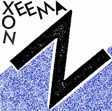 This Noxeema 7″ came to me in an absolutely destroyed package: waterlogged, gloppy cardboard stuffed in one of those “oops, our mistake!” postal-service bags that only hurried the growth of toxic mold within the packaging. Real punk survives such minor setbacks, though, and this 7″ is proof. The label “…” comes from Berlin but Noxeema are from Portland, OR, and they stomp and slip through these eight tracks; surely a debut of which they are proud. It’s almost impossible to go wrong with a sloppy punk 7″ with eight songs on it, and Noxeema certainly succeed on their terms. I’m reminded of the too-cool art-punk of Kleenex mixed with the youthful spazz-rock of Sheep Squeeze or FYP when listening to Noxeema make their way through these tunes. One riff will have me thinking of The Gossip, the next will sound like 7 Seconds… it’s a grab-bag of rudimentary punk, to be sure. I’m even coming around to the musky scent the soaked-and-dried sleeve has been emitting!
This Noxeema 7″ came to me in an absolutely destroyed package: waterlogged, gloppy cardboard stuffed in one of those “oops, our mistake!” postal-service bags that only hurried the growth of toxic mold within the packaging. Real punk survives such minor setbacks, though, and this 7″ is proof. The label “…” comes from Berlin but Noxeema are from Portland, OR, and they stomp and slip through these eight tracks; surely a debut of which they are proud. It’s almost impossible to go wrong with a sloppy punk 7″ with eight songs on it, and Noxeema certainly succeed on their terms. I’m reminded of the too-cool art-punk of Kleenex mixed with the youthful spazz-rock of Sheep Squeeze or FYP when listening to Noxeema make their way through these tunes. One riff will have me thinking of The Gossip, the next will sound like 7 Seconds… it’s a grab-bag of rudimentary punk, to be sure. I’m even coming around to the musky scent the soaked-and-dried sleeve has been emitting!
Pender Street Steppers Faling / Our Time 12″ (Mood Hut)
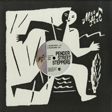 My tolerance for ultra-nostalgic synth-pop dance music lessens with each passing year, a natural result from an overwhelming glut of producers looking to mine the exact same period and influences. Good thing for me, then, that this Pender Street Steppers single, which clearly tries to replicate a very specific ’80s Eurodance sound, is so exceptional! Either bring the hits or don’t bring anything at all – these two cuts (and their respective instrumental dub versions) are perfectly rendered and pristine, activating all my brain’s pleasure-receptors when it comes to dance-club synth-pop such as this. “Falling” pops and locks across a skipping beat, Italo effects in place and a shyly romantic vocal capping off the hook. Truly satisfying, even on repeat. “Our Time” pays just as much homage to the same era, but the shades are down for this one – dramatic romance teetering on heartbreak is in order. Maybe a little Jan Hammer in its confident beat, and a vocalist who melodically deadpans in a voice incredibly close to Heatsick’s Steven Warwick (the British cousin to this Canadian tongue, perhaps). Really fantastic material from this Vancouver-based duo, which manages to celebrate dance music’s past by whipping up a couple of shoulda-been classics.
My tolerance for ultra-nostalgic synth-pop dance music lessens with each passing year, a natural result from an overwhelming glut of producers looking to mine the exact same period and influences. Good thing for me, then, that this Pender Street Steppers single, which clearly tries to replicate a very specific ’80s Eurodance sound, is so exceptional! Either bring the hits or don’t bring anything at all – these two cuts (and their respective instrumental dub versions) are perfectly rendered and pristine, activating all my brain’s pleasure-receptors when it comes to dance-club synth-pop such as this. “Falling” pops and locks across a skipping beat, Italo effects in place and a shyly romantic vocal capping off the hook. Truly satisfying, even on repeat. “Our Time” pays just as much homage to the same era, but the shades are down for this one – dramatic romance teetering on heartbreak is in order. Maybe a little Jan Hammer in its confident beat, and a vocalist who melodically deadpans in a voice incredibly close to Heatsick’s Steven Warwick (the British cousin to this Canadian tongue, perhaps). Really fantastic material from this Vancouver-based duo, which manages to celebrate dance music’s past by whipping up a couple of shoulda-been classics.
Pleroma Vitriol 12″ (Push My Buttons)
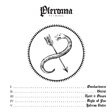 Remember that Swedish post-punk group from a couple years back, Holograms, that sounded like a mix of Iceage’s first album and The Cure’s first couple? I thought they were pretty good, if derivative in an easily-spotted way, and now their guitarist/vocalist, Anton Spetze, has a new group, Pleroma, who sound like… Iceage’s last two albums. Seriously! If you told me Vitriol was a collection of unreleased tracks from Iceage’s most recent sessions, I wouldn’t have trouble believing it, and I consider myself a fan of the group familiar with their sound. Of course, there are some differences: whereas Iceage are perpetually sloppy, grandiose, and uncannily talented at pulling a hook out of some inebriated post-punk melodrama, Pleroma are less peculiar and more musically-adept, which renders these songs a bit more regular than anything Iceage would write, for better or worse. Martial drums pound forth over a super-serious guitar lead and pleading, moaning vocals, while a candle in the shape of Nick Cave’s bust burns softly in the corner. Seriously, go listen to “Night Of Pan”: I’m fairly certain Iceage already wrote this song. A song like “Inferno Valley” sounds more like Tamaryn’s music with Elias Rønnenfelt on vocals, but I’m really splitting hairs at this point. If you can get past the somewhat blatant similarities, or simply aren’t bothered by it (which is certainly reasonable), Vitriol is a promising debut of capable and assuredly hard-edged post-punk goth, but Anton Spetze’s continued sonic similarities to Iceage hit a little too close for my personal comfort.
Remember that Swedish post-punk group from a couple years back, Holograms, that sounded like a mix of Iceage’s first album and The Cure’s first couple? I thought they were pretty good, if derivative in an easily-spotted way, and now their guitarist/vocalist, Anton Spetze, has a new group, Pleroma, who sound like… Iceage’s last two albums. Seriously! If you told me Vitriol was a collection of unreleased tracks from Iceage’s most recent sessions, I wouldn’t have trouble believing it, and I consider myself a fan of the group familiar with their sound. Of course, there are some differences: whereas Iceage are perpetually sloppy, grandiose, and uncannily talented at pulling a hook out of some inebriated post-punk melodrama, Pleroma are less peculiar and more musically-adept, which renders these songs a bit more regular than anything Iceage would write, for better or worse. Martial drums pound forth over a super-serious guitar lead and pleading, moaning vocals, while a candle in the shape of Nick Cave’s bust burns softly in the corner. Seriously, go listen to “Night Of Pan”: I’m fairly certain Iceage already wrote this song. A song like “Inferno Valley” sounds more like Tamaryn’s music with Elias Rønnenfelt on vocals, but I’m really splitting hairs at this point. If you can get past the somewhat blatant similarities, or simply aren’t bothered by it (which is certainly reasonable), Vitriol is a promising debut of capable and assuredly hard-edged post-punk goth, but Anton Spetze’s continued sonic similarities to Iceage hit a little too close for my personal comfort.
Popp Laya LP (Squama)
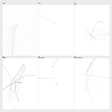 Can’t seem to get enough of records like this one, the debut album by Munich-based drummer Simon Popp. It’s another album of precise and dreamy “fourth world” percussion, music that seems to be borne of natural sounds that are then processed and deployed via covertly synthetic means. File it next to Beatrice Dillon & Rupert Clervaux’s Studies I-XVII For Samplers And Percussion, the great De Leon album, both Mkwaju Ensemble records or any other modern takes on percussion-centric new-age musics. Popp’s percussion runs a wide array of tones, from wooden to metallic, melodically tuned to atonal clanging (but mostly pretty melodic), and he layers his sounds nicely, providing plenty of breathing room without leaving the songs understaffed. Laya certainly fits within the bounds of this sub-genre that seems to be growing in popularity (and rightfully so, as these are some delicately lovely sounds), but Popp is no dilettante – these tracks are inquisitive and playful while also technically solid and masterfully executed. I’d love to see a rig rundown for the track “Partially Ordered”, mostly because I’m expecting a pile of exotic spoons and one long bow hair.
Can’t seem to get enough of records like this one, the debut album by Munich-based drummer Simon Popp. It’s another album of precise and dreamy “fourth world” percussion, music that seems to be borne of natural sounds that are then processed and deployed via covertly synthetic means. File it next to Beatrice Dillon & Rupert Clervaux’s Studies I-XVII For Samplers And Percussion, the great De Leon album, both Mkwaju Ensemble records or any other modern takes on percussion-centric new-age musics. Popp’s percussion runs a wide array of tones, from wooden to metallic, melodically tuned to atonal clanging (but mostly pretty melodic), and he layers his sounds nicely, providing plenty of breathing room without leaving the songs understaffed. Laya certainly fits within the bounds of this sub-genre that seems to be growing in popularity (and rightfully so, as these are some delicately lovely sounds), but Popp is no dilettante – these tracks are inquisitive and playful while also technically solid and masterfully executed. I’d love to see a rig rundown for the track “Partially Ordered”, mostly because I’m expecting a pile of exotic spoons and one long bow hair.
Raspberry Bulbs Before The Age Of Mirrors LP (Relapse)
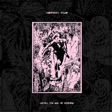 It’s rare to find a band these days that hasn’t positioned itself firmly into some easily-defined aesthetic slot – even though everyone likes every kind of music now, it feels like bands are expected to stay within the formal guidelines of their chosen sub-genre, lest they be misunderstood and ignored. Thankfully, there are still groups bucking this trend, like New York’s Raspberry Bulbs for instance, who have a surface-level black-metal vibe that doesn’t quite equate to the songs they’re playing, much to my delight. There’s a photo of the trio on the insert, who amazingly look like the same guy at 20, 40 and 60 years of age, and while they’ve certainly ensured their music is blackened and grim, the songs themselves offer a variety of strange pathways beyond black-metal’s cloak. “Missing Teeth”, for example, sounds like it could’ve come directly from Ceremony’s Rohnert Park album, whereas other tunes recall Crowbar’s strangulated sludge-metal, Flux Of Pink Indians’ subterranean punk and the Sisyphean chug of Bone Awl (with whom Raspberry Bulbs share a member). The songs themselves are tucked between a number of uneasy interludes, restless little storm clouds that intensify the bleak moods within which Raspberry Bulbs seem to thrive. Before The Age Of Mirrors doesn’t significantly depart from their previous albums, perhaps more a refinement of their dirge-like dungeon-punk, but seeing as Raspberry Bulbs’ particular brew of songwriting and production styles is entirely their own, it’s a welcome addition to an uncrowded field.
It’s rare to find a band these days that hasn’t positioned itself firmly into some easily-defined aesthetic slot – even though everyone likes every kind of music now, it feels like bands are expected to stay within the formal guidelines of their chosen sub-genre, lest they be misunderstood and ignored. Thankfully, there are still groups bucking this trend, like New York’s Raspberry Bulbs for instance, who have a surface-level black-metal vibe that doesn’t quite equate to the songs they’re playing, much to my delight. There’s a photo of the trio on the insert, who amazingly look like the same guy at 20, 40 and 60 years of age, and while they’ve certainly ensured their music is blackened and grim, the songs themselves offer a variety of strange pathways beyond black-metal’s cloak. “Missing Teeth”, for example, sounds like it could’ve come directly from Ceremony’s Rohnert Park album, whereas other tunes recall Crowbar’s strangulated sludge-metal, Flux Of Pink Indians’ subterranean punk and the Sisyphean chug of Bone Awl (with whom Raspberry Bulbs share a member). The songs themselves are tucked between a number of uneasy interludes, restless little storm clouds that intensify the bleak moods within which Raspberry Bulbs seem to thrive. Before The Age Of Mirrors doesn’t significantly depart from their previous albums, perhaps more a refinement of their dirge-like dungeon-punk, but seeing as Raspberry Bulbs’ particular brew of songwriting and production styles is entirely their own, it’s a welcome addition to an uncrowded field.
ROT T.V. F.D.A. / Transylvanian Nights 7″ (RTV Recs)
 Here’s a Melbourne rock checklist for you: Miss Destiny, Cut Sick, Deaf Wish and Slug Guts. Not a bad mix, but what if you cranked it up a little louder and added Annihilation Time? Why, then you’d have a list of the bands that members of ROT T.V. have previously played in! Yup, Annihilation Time’s Graham Clise made the right move (leaving the US for Australia) and presumably wedded Harriet Hudson-Clise, and now they’ve got a new band together that shares their sensibilities of hard-livin’ punk rock. “F.D.A.” chugs along a classic chord progression reminiscent of The Damned, played with the loose n’ boozy attitude of Brutal Knights and the lingering aftertaste of late-period Annihilation Time, to be honest. “Transylvanian Nights” cools it down a bit, a steamy rocker ready for The Cathay De Grande circa 1987, part Joan Jett and part Murder City Devils, sure to make your leather motorcycle jacket smell more like Jack Daniels than it usually does. On the whole, probably a little too Trash and Vaudeville-y for me, in that sort of stylized rocker sorta way (you can already picture those classic Iggy Pop, Joey Ramone and David Bowie posters, can’t you?), but perfectly reasonable for those enamored by that style. Others have bastardized it, but ROT T.V. clearly keep it real.
Here’s a Melbourne rock checklist for you: Miss Destiny, Cut Sick, Deaf Wish and Slug Guts. Not a bad mix, but what if you cranked it up a little louder and added Annihilation Time? Why, then you’d have a list of the bands that members of ROT T.V. have previously played in! Yup, Annihilation Time’s Graham Clise made the right move (leaving the US for Australia) and presumably wedded Harriet Hudson-Clise, and now they’ve got a new band together that shares their sensibilities of hard-livin’ punk rock. “F.D.A.” chugs along a classic chord progression reminiscent of The Damned, played with the loose n’ boozy attitude of Brutal Knights and the lingering aftertaste of late-period Annihilation Time, to be honest. “Transylvanian Nights” cools it down a bit, a steamy rocker ready for The Cathay De Grande circa 1987, part Joan Jett and part Murder City Devils, sure to make your leather motorcycle jacket smell more like Jack Daniels than it usually does. On the whole, probably a little too Trash and Vaudeville-y for me, in that sort of stylized rocker sorta way (you can already picture those classic Iggy Pop, Joey Ramone and David Bowie posters, can’t you?), but perfectly reasonable for those enamored by that style. Others have bastardized it, but ROT T.V. clearly keep it real.
Rubber Blanket Our Album LP (Spacecase)
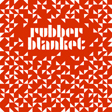 It’s always inspiring when musicians whose bands I’ve enjoyed over the decades – like say, Lars Finberg of The Intelligence and A Frames, for example – move forward with new groups that are interesting, enjoyable and fresh. Finberg’s got that with Rubber Blanket, a new trio (the other two folks coming from Wounded Lion), and following their great debut single, Our Album is something they should all be proud of. I suppose a diligent record-shop employee might file this one under “post-punk / new wave”, but this isn’t the same-old same-old. It’s… pretty odd. I’m reminded of German Shepherds without even the slightest hint of maliciousness, or maybe if Jonathan Richman found himself trapped on an Earcom compilation. The music is simplistic and clunky post-punk synth-wave stuff (in a good way), occasionally reminiscent of The Intelligence’s earliest recordings, but the vocals of Brad Eberhard establish the Rubber Blanket Sound, as he sings in an entertaining awkward-guy-at-karaoke sorta voice, or simply speaks his way through. It’s great, and his lyrics are worth hearing, at turns insightful, curious, eloquent and very, very funny. Opening track “Scented Candle” is a great example: the band’s devious electro-chug is met with hilarious lyrics (it’s about time someone roasted that Vandals song!), resulting in a highly-replayable tune. Fans of Batang Frisco’s sole album, Voice Farm’s first few records and of course The Intelligence should step up and claim this prize.
It’s always inspiring when musicians whose bands I’ve enjoyed over the decades – like say, Lars Finberg of The Intelligence and A Frames, for example – move forward with new groups that are interesting, enjoyable and fresh. Finberg’s got that with Rubber Blanket, a new trio (the other two folks coming from Wounded Lion), and following their great debut single, Our Album is something they should all be proud of. I suppose a diligent record-shop employee might file this one under “post-punk / new wave”, but this isn’t the same-old same-old. It’s… pretty odd. I’m reminded of German Shepherds without even the slightest hint of maliciousness, or maybe if Jonathan Richman found himself trapped on an Earcom compilation. The music is simplistic and clunky post-punk synth-wave stuff (in a good way), occasionally reminiscent of The Intelligence’s earliest recordings, but the vocals of Brad Eberhard establish the Rubber Blanket Sound, as he sings in an entertaining awkward-guy-at-karaoke sorta voice, or simply speaks his way through. It’s great, and his lyrics are worth hearing, at turns insightful, curious, eloquent and very, very funny. Opening track “Scented Candle” is a great example: the band’s devious electro-chug is met with hilarious lyrics (it’s about time someone roasted that Vandals song!), resulting in a highly-replayable tune. Fans of Batang Frisco’s sole album, Voice Farm’s first few records and of course The Intelligence should step up and claim this prize.
Street Weapon Quick To Die 7″ (Not For The Weak)
 Not For The Weak continue to rep big bad hardcore outta Virginia and its associated communities via 7″ EP format. This time it’s the debut of Virginia Beach’s Street Weapon, a new band with members “barely out of high school” as per the label’s note. While I am disappointed to learn that this band graduated high school (true hardcore punks drop out by the 7th grade, duh!), they’re stomping through some mean-spirited hardcore here, old-fashioned and pure. These songs recall Virginia hardcore toughies like Wasted Time, perhaps with a slower NYHC edge, as if Street Weapon spent more time listening to Krakdown than Government Warning. Vocalist Zach has a good schoolyard-bully voice, as though he were the spunky younger brother of Boston Strangler’s Ban Reilly. Basic and true, these tracks complete the mission without adding anything new or vital to the tapestry of hardcore, but that’s usually how it goes. I liked Street Weapon after spinning this disc a few times, and after I perused the liner notes and noticed that drummer Ben’s dad was given photo credit for Ben’s live shot, I liked Street Weapon a little bit more. More supportive fathers in hardcore, please!
Not For The Weak continue to rep big bad hardcore outta Virginia and its associated communities via 7″ EP format. This time it’s the debut of Virginia Beach’s Street Weapon, a new band with members “barely out of high school” as per the label’s note. While I am disappointed to learn that this band graduated high school (true hardcore punks drop out by the 7th grade, duh!), they’re stomping through some mean-spirited hardcore here, old-fashioned and pure. These songs recall Virginia hardcore toughies like Wasted Time, perhaps with a slower NYHC edge, as if Street Weapon spent more time listening to Krakdown than Government Warning. Vocalist Zach has a good schoolyard-bully voice, as though he were the spunky younger brother of Boston Strangler’s Ban Reilly. Basic and true, these tracks complete the mission without adding anything new or vital to the tapestry of hardcore, but that’s usually how it goes. I liked Street Weapon after spinning this disc a few times, and after I perused the liner notes and noticed that drummer Ben’s dad was given photo credit for Ben’s live shot, I liked Street Weapon a little bit more. More supportive fathers in hardcore, please!
The Strokes The New Abnormal LP (RCA / Cult)
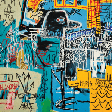 Personal anecdote time: I bought the first Strokes album shortly after it came out, on CD, at Best Buy, because it was one of those inexplicable deals where they’d price certain new CDs at like $9.99 (and there weren’t any No Limit Records CDs tempting me instead). It was love at first listen, and while the group has strayed from that pitch-perfect script over the following nineteen years, I’ve always found something to enjoy in their albums, usually due in no small part to the voice of the precocious and inscrutable Julian Casablancas. It seems The New Abnormal is being hailed as a return to form, the old Strokes returning to the acutely hip, retro-winking, metropolitan rock of yore, and I’m not particularly seeing that so much as a steady continuation of their third and fourth albums. The same old parts are here and clearly in well-oiled shape, and while it’s no disappointment, there isn’t much to get truly excited about either, unlike the Julian Casablancas solo album and his first record with The Voidz (underrated semi-mainstream rippers to be sure). The good is that Casablancas continues to whip his voice up into a blinding falsetto, at what seems to be the pleasure and insistence of only himself, whereas the bad is that The Strokes somehow managed to drag these Strokes-y songs to an average of five minutes’ length, songs that would’ve benefitted from nips and tucks against the tendency to bloat. Is there any popular rock band that has slowly shortened the average length of their songs as they progressed? If one exists, they’re my heroes. I suppose all I really wanted was one new Strokes hit from The New Abnormal, which I’ve got in “Brooklyn Bridge To Chorus”: it invokes Survivor-style synths before leading into a weirdly sincere and self-deprecating chorus. In a time where it seems like the worst case scenario is also the most likely outcome, this underwhelming-but-not-disappointing new Strokes album feels like a subtle relief.
Personal anecdote time: I bought the first Strokes album shortly after it came out, on CD, at Best Buy, because it was one of those inexplicable deals where they’d price certain new CDs at like $9.99 (and there weren’t any No Limit Records CDs tempting me instead). It was love at first listen, and while the group has strayed from that pitch-perfect script over the following nineteen years, I’ve always found something to enjoy in their albums, usually due in no small part to the voice of the precocious and inscrutable Julian Casablancas. It seems The New Abnormal is being hailed as a return to form, the old Strokes returning to the acutely hip, retro-winking, metropolitan rock of yore, and I’m not particularly seeing that so much as a steady continuation of their third and fourth albums. The same old parts are here and clearly in well-oiled shape, and while it’s no disappointment, there isn’t much to get truly excited about either, unlike the Julian Casablancas solo album and his first record with The Voidz (underrated semi-mainstream rippers to be sure). The good is that Casablancas continues to whip his voice up into a blinding falsetto, at what seems to be the pleasure and insistence of only himself, whereas the bad is that The Strokes somehow managed to drag these Strokes-y songs to an average of five minutes’ length, songs that would’ve benefitted from nips and tucks against the tendency to bloat. Is there any popular rock band that has slowly shortened the average length of their songs as they progressed? If one exists, they’re my heroes. I suppose all I really wanted was one new Strokes hit from The New Abnormal, which I’ve got in “Brooklyn Bridge To Chorus”: it invokes Survivor-style synths before leading into a weirdly sincere and self-deprecating chorus. In a time where it seems like the worst case scenario is also the most likely outcome, this underwhelming-but-not-disappointing new Strokes album feels like a subtle relief.

